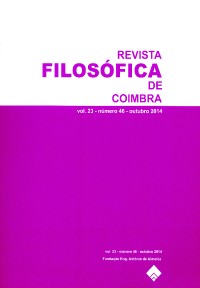Please use this identifier to cite or link to this item:
https://hdl.handle.net/10316.2/35585| DC Field | Value | Language |
|---|---|---|
| dc.contributor.author | Sánchez Madrid, Nuria | - |
| dc.date.accessioned | 2015-01-15T11:49:20Z | |
| dc.date.accessioned | 2020-09-24T17:44:25Z | - |
| dc.date.available | 2015-01-15T11:49:20Z | |
| dc.date.available | 2020-09-24T17:44:25Z | - |
| dc.date.issued | 2014 | - |
| dc.identifier.issn | 0872-0851 | - |
| dc.identifier.uri | https://hdl.handle.net/10316.2/35585 | - |
| dc.description.abstract | El artículo analiza la relación que lenguaje, poder y comunidad mantienen en la obra filosófica y poética de Dante. En primer lugar, se ocupa de reconocer qué idea de la existencia humana subyace a la fundamentación dantiana del Imperio como poder político autónomo de la institución eclesial. En segundo lugar, se hace cargo de la consideración del lenguaje como capacidad específica del ser humano e instrumento principal de constitución de una comunidad política, destacando que poetas y políticos han de colaborar en la tarea de regeneración moral que permita a los hombres corresponder a su estatuto racional. Extraemos la conclusión de que la naturalidad del habla no exime de la necesidad de recuperar por medio de la técnica una virtud de la que los primeros hombres pudieron gozar de manera natural. | spa |
| dc.description.abstract | The paper deals with the connection between language, political power and social community in the philosophical and poetic works of Dante. First, I tackle the idea of human existence that supports Dante’s foundation of the Empire as an autonomous political power in regard to the ecclesiastical institution. Second, it appraise Dante’s consideration of language as an specific capacity of human beings and as a crucial instrument for building up a political community, noting that poets and politicians ought to collaborate in the task of moral regeneration that enables human beings to satisfy their rational status. I draw the conclusion that the naturalness of speech does not remove for Dante the need to recover with the help of the technique a virtue that in the cradle of humankind the human being might have enjoyed naturally. | eng |
| dc.language.iso | spa | - |
| dc.publisher | Faculdade de Letras da Universidade de Coimbra, Instituto de Estudos Filosóficos | - |
| dc.subject | Dante | - |
| dc.subject | lengua vulgar | - |
| dc.subject | unidad del entendimiento | - |
| dc.subject | filosofía moral | - |
| dc.subject | Imperio | - |
| dc.subject | Dante | eng |
| dc.subject | Vulgar | eng |
| dc.subject | Unity of the Intellect | eng |
| dc.subject | Moral Philosophy | eng |
| dc.subject | Empire | eng |
| dc.title | «Opera naturale é ch'uom favella»: lenguaje, poder y comunidad en Dante Alighieri | por |
| dc.type | article | - |
| uc.publication.collection | Revista Filosófica de Coimbra vol. 23, nº 46 | - |
| uc.publication.firstPage | 375 | - |
| uc.publication.issue | 46 | - |
| uc.publication.lastPage | 396 | - |
| uc.publication.location | Coimbra | - |
| uc.publication.journalTitle | Revista Filosófica de Coimbra | - |
| uc.publication.volume | 23 | por |
| dc.identifier.doi | 10.14195/0872-0851_46_6 | - |
| uc.publication.section | Artigos | - |
| uc.publication.orderno | 7 | - |
| uc.publication.area | Artes e Humanidades | - |
| uc.publication.manifest | https://dl.uc.pt/json/iiif/10316.2/35585/242302/manifest?manifest=/json/iiif/10316.2/35585/242302/manifest | - |
| uc.publication.thumbnail | https://dl.uc.pt/retrieve/11658049 | - |
| item.grantfulltext | open | - |
| item.fulltext | With Fulltext | - |
| Appears in Collections: | Revista Filosófica de Coimbra | |
Files in This Item:
| File | Description | Size | Format | |
|---|---|---|---|---|
| rfc46_artigo7.pdf | 6.92 MB | Adobe PDF |  |
Items in DSpace are protected by copyright, with all rights reserved, unless otherwise indicated.
